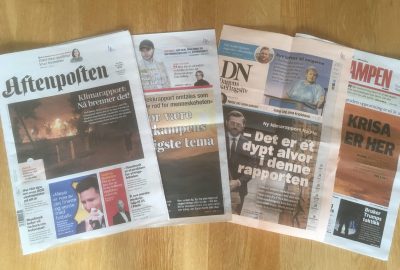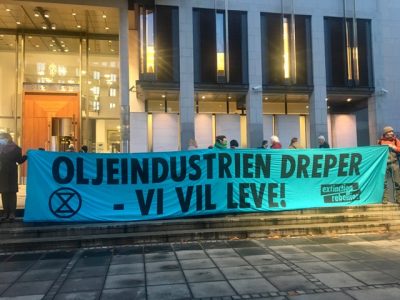NEWS ANALYSIS: The front pages of Norwegian newspapers on Tuesday were all prominently featuring the UN’s dire report this week that deadly climate change is well underway. All of Norway’s biggest political parties, however, are defying the UN secretary general’s plea to stop looking for more sources of coal, oil and gas.

Neither the Conservative Party (Høyre) nor the opposition parties Labour (Arbeider-partiet), Center (Senterpartiet) and Progress (Frem-skrittspartiet) will agree to rein in either Norwegian oil and gas production or exploration. Top Norwegian politicians, usually anxious and willing to cooperate with the UN, simply refuse to curtail Norway’s biggest source of income.
Their reasons are as creative yet repetitive and even hypocritical as ever, for a country that otherwise champions an environmentally friendly image: The world will still need oil and gas for years to come, they insist, and Norway produces both in what they claim is the world’s cleanest and most climate-friendly manner. Ola Borten Moe, deputy leader of the Center Party, further claimed on national radio Tuesday morning that the main reason the UK has been able to reduce its emissions (while Norway’s have risen) is because British officials have replaced coal as an energy source “with gas produced in Norway.”
Moe, a former oil minister who now works in the oil business along with being a farmer and politician, went on to claim on NRK’s popular political talk show Politisk kvarter that his Center Party would instead tackle climate change through a new fund aimed at helping the transport industry reduce emissions, and by investing in carbon capture and storage (even though earlier attempts at such were dropped when Center was part of the last Labour-led government). Moe conceded that Norway (still a major timber producer) engages in the deforestation that further spurs climate change, but claimed his Center Party was also willing and eager to plant more trees (likely at taxpayer expense).
“We will not do anything that’s stupid (like cutting back on oil exploration and the jobs it produces),” said Moe, who seemed firmly planted in denial mode. His comments, branded as bare tull (simply nonsense) by the Greens Party’s candidate for Parliament Lan Marie Berg, came just hours before oil company Lundin announced Tuesday that it would commence trial production from its new Rolvsnes oil discovery in the North Sea. If successful, Lundin will likely move forward with full development of the Rolvsnes oil field.
Oil opposition lacks clout
The five political parties in Parliament that favour a halt to more oil and gas exploration include the Greens (MDG), the Liberals (Venstre), the Christian Democrats (Kristelig Folkeparti), the Socialist Left (SV) and the Reds (Rødt). They’re all small, with little voter clout behind them, but all claimed the UN’s numbers and words were “so clear” that Norway must now turn down all applications for more offshore exploration licenses, like the UN wants.
The Liberals, part of the current non-socialist government, actually have political control of the ministry in charge of climate and environmental issues, but their hands are tied since the Conservatives-led government policy is to keep drilling for more oil, even in the sensitive Arctic. Environment Minister Sveinung Rotevatn of the Liberals had to receive the UN’s report sheepishly on Monday, and endure a verbal assault by Greens leader Une Bastholm.

Prime Minister Erna Solberg of the Conservatives and both of her rivals for the job from Labour and Center all express concern about the climate but offer only what experts and climate activists view as weak solutions mostly aimed at protecting Norway’s oil, gas and agriculture. Solberg, who was formally launching her plans on Monday for a third term in office, agreed the report confirmed “a connection” between climate change and extreme weather and even claimed that “our generation has a responsibility not to leave that challenge to future generations.” All her party is willing to do to help reverse climate change, however, is to offer even more funding to agencies promoting energy efficiency and new energy sources, to raise fees and taxes on carbon emissions, promote electric vehicles and invest in more public transportation. She still claims Norway will cut its own emissions by 50-55 percent in non-quota sectors by 2030 and promote both hydrogen plans and offshore wind energy.
Solberg’s government rolled out a new “climate fund” last month (external link to the government’s website) that’s due to allocate NOK 10 billion (USD 1.1 billion) over the next five years to invest in renewable energy in developing countries. The goal is to help reduce emissions in the poorer countries, similar to how Labour’s fund to preserve rainforests tried to do the same. Both funds leave Norwegian taxpayers paying other countries to cut emissions, instead of cutting their own at home in Norway. Solberg nonetheless insists the fund “is an essential part of Norway’s contribution to achieve the goals set out in the Paris Agreement. Critics claim it simply can allow Norway to avoid cutting its own emissions: “It’s too little, too late,” said Kari Elisabeth Kaski of SV, noting how Solberg’s government earlier has cut foreign aid for renewable energy in developing countries.
Climate and the election campaign
Labour, Norway’s biggest party at present, backs the new fund and won’t halt drilling rigs off Norway or turn off the oil pumps either, even though its energy spokesperson Espen Barth Eide said climate change “should be the election campaign’s biggest issue.” He seemed genuinely alarmed over how UN Secretary General Antonio Guterres claimed that all coal and fossil forms of energy must be stopped “before they destroy our planet.” Guterres noted how the International Energy Agency (IEA) also has called for an end to all further oil and gas exploration.
Solberg’s government is ignoring the IEA’s call, too, a move Eide of the Labour Party also supports. Both of their “steering” parties are acutely aware of how the value of Norway’s krone falls when the oil price does, like it has this week. Eide stresses how demand for oil and gas will decline, however, as new renewable energy sources emerge. “We won’t produce more energy than the world needs, but we won’t stop producing oil and gas in any scenario,” Eide told newspaper Dagsavisen on Tuesday. “We won’t search for more (oil) than needed.” But Labour won’t stop searching entirely now.

Others also contend climate change should be the most important issue in next month’s election. “It’s possible to campaign without talking too much about the climate,” wrote Kjetil B Alstadheim, political commentator for newspaper Aftenposten, on Tuesday, “but it will be impossible to run the country without taking the climate problem seriously.” Experts also contend devastating floods like those in Germany this summer can occur in Norway, too, as can fires, if Norway’s emissions aren’t cut drastically, and quickly, in order to reverse climate change. The only way to do that is to phase out oil and gas.
The UN’s report will force its concerns onto the agenda, Alstadheim predicts, while the EU’s recently released plan for cutting emissions by 55 percent by 2030 will force Norway’s participation. The EU’s plan, which will eventually forbid the sale of fossil-fueled cars and sharply cut allowable emissions from aircraft and ships, is aimed at nothing less than averting global catastrophe. It may also boost willingness, at least among young Norwegians, to join the EU. That’s the only way Norway could have more influence over the plan it’s compelled to follow over the coming decades through its trade agreement with the EU. New research shows an 8 percent increase in the numbers of young Norwegians wanting to join the EU, in order not to be relegated to the corridors.
Progress Party won’t meet with experts
Ketil Solvik-Olsen, deputy leader of the conservative Progress Party, predictably downplayed the UN’s new climate report and doesn’t like the EU’s plan either. Progress is firmly pro-oil and has long been in denial mode regarding climate change. Solvik-Olsen declared once again that if Norway halts oil exploration, other countries with less-regulated oil and gas industries will merely step in and “take our place.” He also claims that phasing out Norway’s oil industry will “give increased economic influence and power to Russia and many other OPEC producers.”
Climate researchers, meanwhile, stress that climate change “is here, and happening very quickly around the world.” Bjørn Samset, senior researcher at the CICERO Center for climate research, told Dagsavisen that the UN’s report also shows how climate change “will be stronger” than expected, and “we’ll simply have to adjust to a new climate. We must prepare for more extreme weather.” In Norway, Samset said, there will more more torrential rain and flooding, along with more heat waves and extreme temperatures. “We’ll have longer summers and shorter winters, and that will affect nature and agriculture,” Samset said.
In that sense it’s almost odd that the Center Party, which firmly objects to the EU’s plan to deal with climate change, isn’t more worried about the effect oil and the climate are already having on its own constituency. Farmers had to deal with a major drought three years ago, and demanded state compensation for losses. Samset said he has been called upon to speak about climate change with all of Norway’s political parties, except Progress. He said new party leader Sylvi Listhaug hasn’t yet agreed to meet with Samset to listen to his concerns and recommendations.
‘Just business as usual’
It should be noted that Norwegians themselves aren’t helping as much as they could. They’ve bought lots of electric cars (mostly to avoid tolls, taxes and be able to use the bus lanes on highways) but as Corona restrictions ease, Norwegians are out traveling again and burning fossil fuel. Demand for airline routes has taken off this summer, despite much higher ticket prices, and even cruise travel remains popular with many. The Greens Party could proudly report, however, that it received hundreds of new membership applications after the UN report was released.
Norway’s own environmental advocates are disappointed by the country’s climate policy, and by Norwegian politicians’ ongoing refusal to curtail Norway’s offshore industry. “Even in this terrible year for the climate, election campaign issues are all about cheaper gasoline and diesel, oil drilling in the Barents and construction of more highways,” complained Truls Gulowsen, leader of Norway’s chapter of Friends of the Earty (Naturvernforbundet). “The compact majority of the Conservatives, Labour, Progress and Center won’t have climate on the agenda, because they know they don’t have any good solutions. They can’t manage to prioritize the good climate solutions that are stacking up in climate ministries aroudn the world.
“It’s just business as usual.”
newsinenglish.no/Nina Berglund

